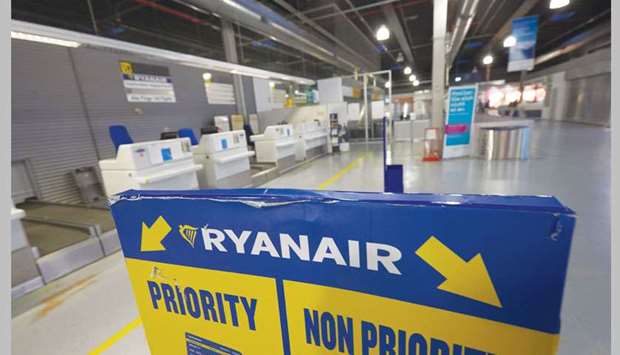Ryanair endured its worst one-day strike yesterday after a walkout by pilots in five European countries disrupted the plans of an estimated 55,000 travellers with the budget airline at the height of the summer holiday season.
Ryanair has been unable to quell rising protests over slow progress in negotiating collective labour agreements.
In response to unions serving strike notices, Ryanair had announced the cancellations of 250 flights in and out of Germany, 104 to and from Belgium, and another 42 in Sweden and its home market of Ireland, where around one-quarter of its pilots were staging their fifth 24-hour walkout.
The airline expected the travel plans of 42,000 travellers to be hit by the action in Germany alone, with the majority of passengers switched to another Ryanair flight and the remainder either refunded or rerouted.
“What I find unjustified is that the pilots draw the short straw, because people want to fly cheaply,” said Daniel Flamman, one of several passengers Reuters spoke to at Frankfurt airport who said they sympathised with the pilots. “It’s annoying that it’s happening in the summer holidays, but it’s the only means they have.”
Ingolf Schumacher, pay negotiator at Germany’s Vereinigung Cockpit (VC) union, said pilots had to be prepared for “a very long battle” and that it could take months to push through change at Europe’s largest low-cost carrier.
The unrest is one of the biggest challenges to face long-term chief executive Michael O’Leary, who was once quoted as saying that he would rather cut off his hand than recognise unions and on another occasion crossed a picket line of baggage handlers to help load a plane.
The outspoken O’Leary has in recent years tried to soften Ryanair’s abrasive public image, fearing that it could be counter-productive for Europe’s most profitable airline.
Unions are pushing for better pay and conditions at Ryanair and want collective labour contracts governed by local laws, rather than Irish ones.
Among other issues, they are also seeking changes to Ryanair’s practice of moving staff to different bases without much notice, and a reduction in hours.
A Dutch court rejected a case from Ryanair seeking to block pilots in the Netherlands from joining the strike, but the Irish airline said all of its flights there would run as scheduled.
The impact of the strike was limited with Ryanair apparently able to replace the striking Dutch pilots.
Shares in the airline were 4.2% lower at €12.97 by 1240 GMT, having fallen 21% since the action ramped up in mid-July to stand well below the €14.21 they slumped to in December when Ryanair shocked markets by recognising unions.
Ryanair has said that strike action will hit average fares because it takes up seats that it could otherwise have sold at a high last-minute price.
Ryanair insists that it will not change the low-cost model that transformed the industry and has made it Europe’s most profitable airline.
At Charleroi Airport, Belgium’s second largest and a major Ryanair hub in the region, striking staff gathered in the departure hall and held up banners reading “Ryanair must change- Respect us”.
“Ryanair is the only multinational in Belgium that doesn’t respect the Belgian law and that’s not normal,” said Didier Lebbe, a representative of union ACV-CSC, whose demands include securing its pilots pay when they are on stand-by.
Belgian passenger Stephane Levens, who had to cancel several business meetings after her return flight from Italy was scrapped, was sanguine about the disruption.
“You know what to expect when you’re a Ryanair customer, they’re the cheapest,” she told Belgian broadcaster RTBF.
Belgian consumer protection group Test Achats meanwhile announced it was taking Ryanair to the European Court of Justice to demand compensation for affected passengers.
The organisation rubbished Ryanair’s claim that the strikes were a case of “extraordinary circumstances”, and said under EU legislation passengers were entitled to between €250 and €600 ($285-$690) in compensation.
The unprecedented cross-border strike action is the biggest escalation yet in Ryanair’s long-simmering dispute with cockpit and cabin crews.
The airline already suffered a round of strikes by cockpit and cabin crew last month that disrupted 600 flights in Belgium, Ireland, Italy, Portugal, and Spain, causing travel mayhem for 100,000 people.
Ryanair, which carries some 130mn passengers annually, averted widespread Christmas strikes last year by agreeing to recognise trade unions for the first time in its 33-year history, but it has struggled to reach agreements.
The famously low-budget company boasts lower costs per passenger than its competitors and is eyeing profits of around €1.25bn this year.
But Ryanair pilots say they earn less than their counterparts at rival airlines.
Unions also want the airline to give contractors the same work conditions as staff employees.
At a Frankfurt press conference on Wednesday, Ryanair’s chief marketing officer Kenny Jacobs said the company had already offered pilots a 20% pay rise this year, and was committed to giving all its pilots in Germany permanent contracts by the end of 2018.
But German daily Bild said Ryanair’s starting salary of around €40,000 per year was well below what entry-level pilots made at EasyJet.
And Ryanair’s maximum basic salary of €110,000 – which can be topped up depending on flying hours – was half of what Lufthansa’s most experienced pilots get.
Ryanair has repeatedly said it remains open to further talks with pilot representatives.
But its combative chief executive Michael O’Leary has also warned the airline may shift jobs and planes to more profitable areas if the turmoil continues.
It has already threatened to move part of its Dublin fleet to Poland, which could cost 300 jobs, including 100 pilot positions.
“The problem with Ryanair is that it’s all stick and no carrot,” a Belgian pilot told AFP on condition of anonymity. “They are always putting us under pressure.”

Empty Ryanair check-in desks are seen at the Frankfurt-Hahn Airport in Hahn, western Germany, as pilots of the company staged a strike.
